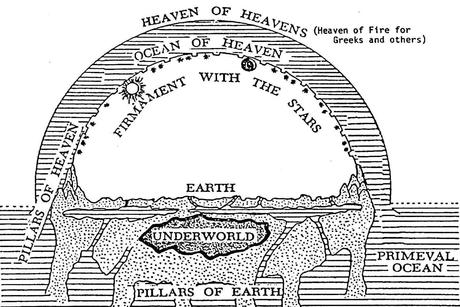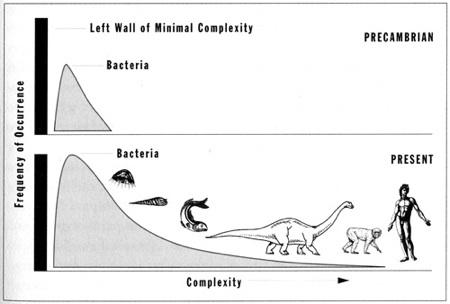Ever since humans began thinking and talking about the world, they have had ideas about its nature and cosmic placement. Cosmological thinking surely goes back to the Upper Paleolithic and has been fodder for debate for perhaps 45,000 years. Systematic thinking on the subject began 2,500 years ago when a group of thinkers (mostly in Greece) whom we now call philosophers began recording their speculations about the cosmos.

Philosophy and cosmology have long been linked and in some ways are the same subject. Knowing this, it is slightly odd to see a piece over at the Atlantic subtitled “The New Philosophy of Cosmology.” Because philosophy has been doing cosmology for a long time, this implies that it is now doing it some new kind of way. Perhaps. It could be that theoretical physics has run up against a wall and philosophy is required to re-think foundations and ask fresh questions.
Several such questions were posed to NYU philosophy professor Tim Maudlin, who had some interesting things to say. I encourage you to read the entire interview but want to extract these nuggets for brief comment:
You have others saying that time is just an illusion, that there isn’t really a direction of time, and so forth. I myself think that all of the reasons that lead people to say things like that have very little merit, and that people have just been misled, largely by mistaking the mathematics they use to describe reality for reality itself. If you think that mathematical objects are not in time, and mathematical objects don’t change — which is perfectly true — and then you’re always using mathematical objects to describe the world, you could easily fall into the idea that the world itself doesn’t change, because your representations of it don’t.
This has long been one of my pet peeves: just because mathematics can accurately describe and predict certain things, it doesn’t mean that the universe or reality is itself nothing more than the unfolding of some quantitative essence. In fact there many things that math can’t describe or predict. Math is an incredibly useful and revealing technique for describing certain aspects of the universe; it does not constitute reality. Math is not a metaphorical god, though the theologically inclined often fall into this kind of tautological thinking.
In another portion of the interview, Maudlin comments on evolutionary process:
When people make these probabilistic equations, like the Drake Equation, they introduce variables for the frequency of earth-like planets, for the evolution of life on those planets, and so on. The question remains as to how often, after life evolves, you’ll have intelligent life capable of making technology. What people haven’t seemed to notice is that on earth, of all the billions of species that have evolved, only one has developed intelligence to the level of producing technology. Which means that kind of intelligence is really not very useful. It’s not actually, in the general case, of much evolutionary value.
We tend to think, because we love to think of ourselves, human beings, as the top of the evolutionary ladder, that the intelligence we have, that makes us human beings, is the thing that all of evolution is striving toward. But what we know is that that’s not true. Obviously it doesn’t matter that much if you’re a beetle, that you be really smart. If it were, evolution would have produced much more intelligent beetles. We have no empirical data to suggest that there’s a high probability that evolution on another planet would lead to technological intelligence.
Here Maudlin describes another error often made by the theologically inclined. An anthropocentric view which places humans at the center of everything creates the illusion that evolution is directed toward some goal. It isn’t. Life began on earth some 3 billion years ago and after 3 billion years of evolution, the vast majority of life forms remains simple. We live in a microbial world, not an intelligent one.
If microbes could write evolutionary history, things would look much different. In the absence of such a history the next best thing is Stephen Jay Gould’s Full House (1997), which shatters the illusion that evolution is progressive. The greatest frequency of life on earth, in terms of biomass and diversity, remains firmly against the left wall of minimal complexity, close to where it began:

Graph Depicts Mode or Frequency of Both Past and Present Life Forms on Earth
The preceding post prompted this observation from my blogging friend Tom Rees: “The graph does show that evolution is directional. Complex brains have to build on less complex brains.” Without the accompanying text from Gould’s Full House, I see how it could be interpreted this way. So let me summarize and gloss the arguments which explain the graph:
Directional evolution is in the eye of the human (or primate or mammal) beholder. The mode of life — its greatest frequency, biomass, and diversity — is up against (or near) the left wall of non-complexity. It started there, and after evolving for over 3 billion years, it has remained there. This doesn’t look very directional.
Toward the left side of non-complexity and non-intelligence, we have microbes and, moving toward the right, we have insects. In terms of numbers, species, biomass, and diversity, these are the dominant forms of life on earth. These forms are still evolving, but they aren’t evolving towards complexity or intelligence.
Our multicellular prejudice — our love for big things that we can easily observe — causes us to focus on the right side of complexity and intelligence, and then claim that these relatively few and non-diverse species indicate evolution is directional. I don’t see how we can justify this argument.
Isolating a single and uncommon strand of evolution, such as the right tail of complexity or intelligence, doesn’t make evolution directional to the right. The fact remains that the isolated right tail of evolution is dwarfed by the diversity and mass of life to the left, which is non-complex and non-intelligent. This mass of life to the left has not been static either; it too has evolved — it just hasn’t evolved towards complexity or intelligence.
I’m not sure what the rationale or argument would be for mono-focusing on the right tail, which is an evolutionary outlier, and not considering everything to the left. If we look at the whole or entire picture of evolutionary life, it is non-directional. If evolution were directional, then all forms of life would show movement toward the right or towards multi-cellularity, complexity, sentience, and intelligence. That hasn’t happened and isn’t happening.
Have complexity and intelligence evolved? Yes. Does this mean evolution is directional? No.

